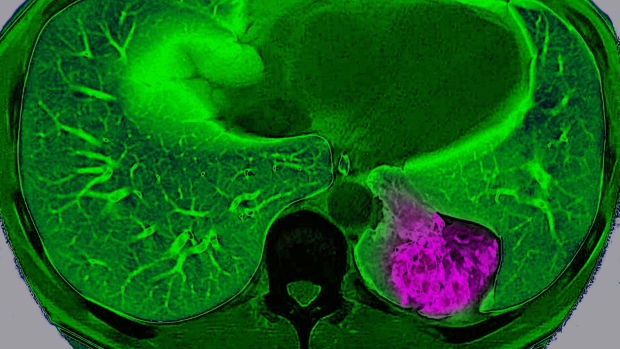Feb 19, 2024
AstraZeneca Drug Slows Progression in Advanced Lung Cancer
, Bloomberg News

(Bloomberg) -- AstraZeneca Plc shares rose after trial data showed Tagrisso slowed disease progression in patients with advanced lung cancer in another win for the pharmaceutical giant’s blockbuster drug.
The trial looked at Tagrisso as a maintenance therapy for patients with non-small cell lung cancer and a specific genetic mutation, where there is no targeted treatment available.
AstraZeneca said the trial showed a statistically significant and highly clinically meaningful improvement in progression-free survival for patients whose cancer was unable to be removed by surgery and had responded to initial chemoradiation. This is is when patients have chemotherapy alongside radiotherapy.
Tagrisso, alongside chemotherapy, was also approved by the US Food and Drug Administration on Feb. 16, for advanced, non-small cell lung cancer.
AstraZeneca’s shares rose as much as 3.9% in early London trading.
“What what we’ve seen is overwhelming efficacy with these data,” Susan Galbraith, AstraZeneca’s executive vice president of oncology R&D, said in an interview. “It’s very exciting that you’ve got an option for these patients because at the moment they either don’t get anything or some patients get the immunotherapy.”
Lung cancer is the leading cause of cancer death and is often diagnosed when it is already in advanced stages. Non-small cell lung cancer — which Tagrisso targets — is the most common type of the disease.
Chief Executive Officer Pascal Soriot is reaping the benefits of his bet on cancer drugs, with AstraZeneca having invested heavily in this area, including through collaborations with companies such as Daiichi Sankyo Co. One of the drugs under that partnership — Dato-DXd — was accepted for regulatory review in the US, the companies said on Monday.
The acceptance of Dato-DXd was encouraging, according to Galbraith. It comes after questions were raised about data from the trial of the drug in lung cancer patients, where results seemed to fall short of investors’ expectations.
The Tagrisso trial results on Monday “represent a major advance” for patients, said Suresh Ramalingam, the principal investigator in the trial. Ramalingam said it showed that Tagrisso could be the first targeted treatment option for patients with stage 3 of the disease.
The results also showed “a favourable trend” for overall survival but the company said the data wasn’t mature enough at the time of the analysis.
The cancer drug is already AstraZeneca’s top oncology earner, bringing in 13% of the company’s sales in 2023.
(Updates with shares and executive interview)
©2024 Bloomberg L.P.


